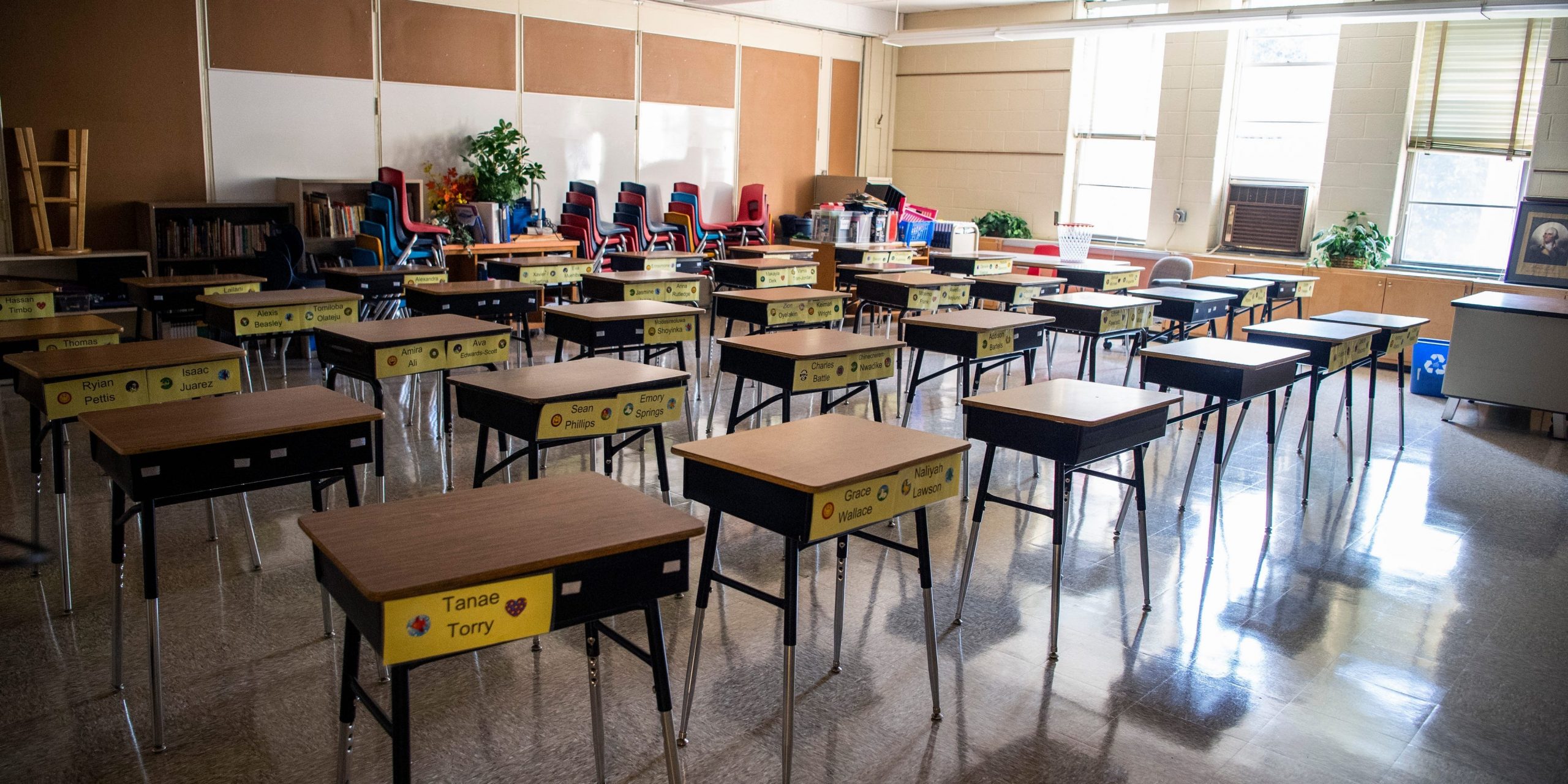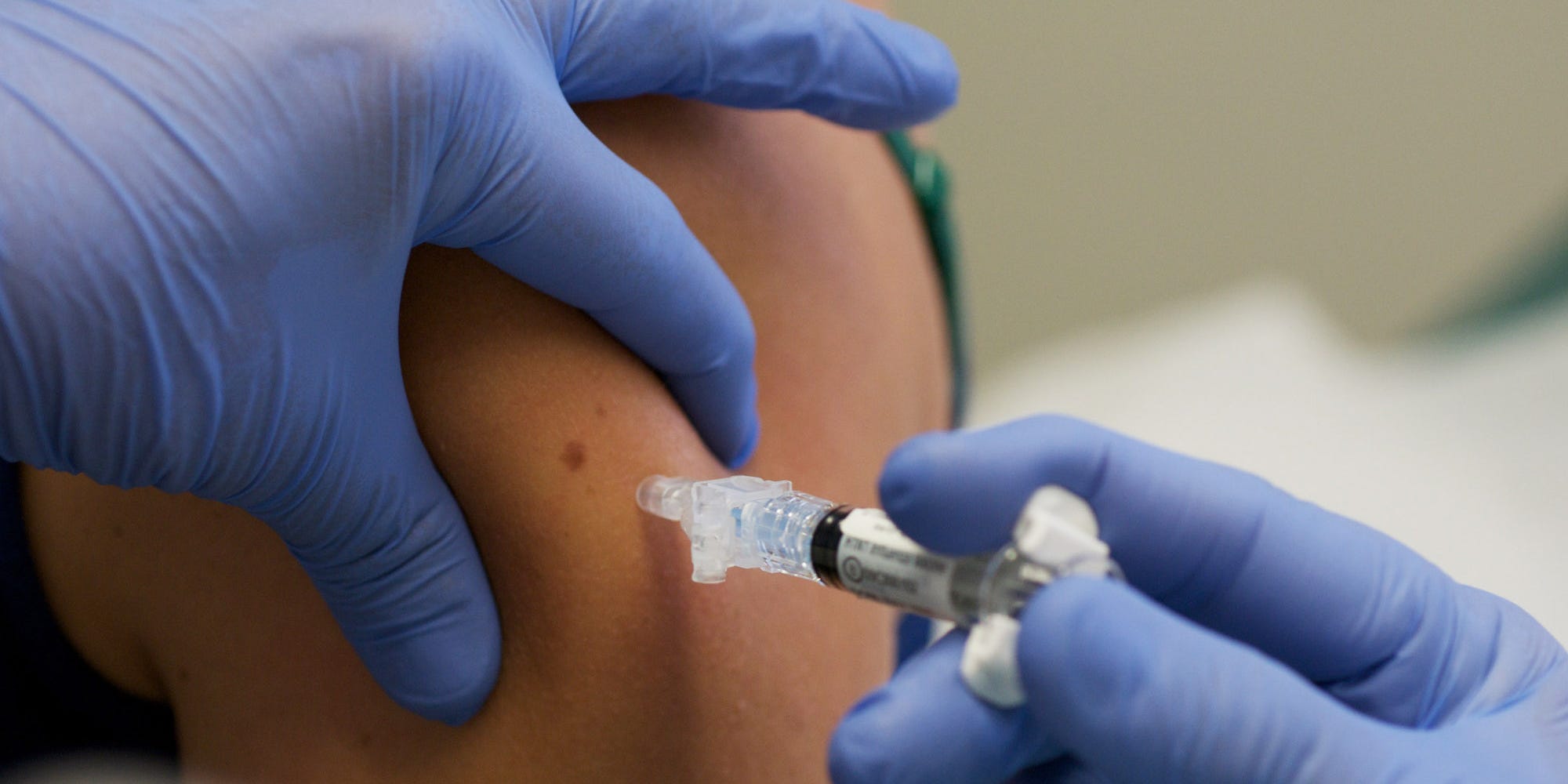
Tom Williams/CQ-Roll Call, Inc via Getty Images
- Schools across the country are starting to reopen after nearly a year of virtual education.
- Many teachers still don’t know when they can get the vaccine and are hesitant to return to the class before.
- The emergence of new COVID-19 variants is particularly worrisome.
- Visit Insider’s homepage for more stories.
When first-grade teacher Shandel Oderman’s school district started bringing students back to the classroom after winter break, she had anxiety about returning in-person and un-vaccinated.
The Ridgefield, Washington, educator applied to stay remote due to a health condition, but others in her building weren’t so lucky.
“One of my teammates had a lot of anxiety,” Oderman said. “She said it was super stressful and said there’s no way to stay 6 feet apart, but she didn’t have any health conditions, and neither did anyone in her household, so she couldn’t really apply to stay.”
Despite rising COVID-19 cases in many states and deaths continuing to peak, schools across the country are starting to reopen, after nearly a year of virtual learning.
Meanwhile, most teachers haven’t received the vaccine yet and are struggling to find the balance between providing the best education for their students while protecting their own health.
Oderman said she knows most teachers want to be with their students right now. But she's tired of feeling like educators aren't prioritized.
"Teachers are just tired of being told to sacrifice themselves," Oderman said. "Like, okay I'll already take a bullet for you during a mass shooting but I never agreed to bring a bullet home to my kid, or my husband."
And teachers have been making sacrifices for months because of the pandemic, according to Randi Weingarten, president of the American Federation of Teachers.
"They've had to turn their lives upside down and change their practices in a nanosecond," Weingarten said. "They feel dismissed and dispensable."
Experts say vaccine prioritization for educators is a must if schools are going to reopen
The prioritization of teachers getting a coronavirus vaccine is uneven across the country - even within states - according to Education Week, which is tracking when teachers are elligible for the shot.
Many of the teachers Insider spoke to shared concerns about the rush to reopen schools while they wait to get vaccinated. Only one teacher Insider spoke to had an appointment scheduled to receive the vaccine, and he feared a rumored shortage of supply in the state could mean it would be rescheduled.
Others could only guess when they might be able to get it.

Getty/David Greedy
Weingarten said it's unrealistic to wait for all teachers to be vaccinated to reopen schools. Instead, states and schools should take a phased approach, prioritizing vaccinations for the teachers and staff who are returning first or are already in-person, then aligning remaining educator vaccines with the rest of school reopenings.
"You can't say we're opening schools February 1st, but by the way, we're not going to start vaccines for educators until mid-February," Weingarten said.
Weingarten's organization has been fighting for months to prioritize educators in vaccine rollout. The American Federation of Teachers fought to get teachers moved into the 1B priority level of the federal vaccine guidance with other essential workers.
She blamed the Trump Administration for politicizing the push to reopen schools and said that politicization is responsible for many of the fights that are igniting across the country between teachers' unions and school districts.
The Chicago Teachers Union reportedly said that a majority of its members had voted to strike if the Chicago School District forced teachers back into the classroom. Students at Chicago Public Schools were poised to go back on February 1. Negotiations are still being held between Chicago Public Schools and the Chicago Teachers Union over how to safely go back to the classroom, which will likely happen this week.
In Bellevue, Washington, teachers who feared for their safety refused to participate in in-person schooling. The district responded by saying it would still reopen and use non-union staff instead, according to KUOW.
A new COVID-19 variant could change much of what we thought we knew about how the virus behaves in schools
For months, health experts have said that reopening schools with public health measures in place, is unlikely to lead to massive outbreaks, particularly for elementary schools.
But Dr. Vin Gupta, a critical care pulmonologist and an affiliate assistant professor at the University of Washington's Institute for Health Metrics and Evaluation, said that may no longer be the case.
"It's changed in the last four to six weeks in light of what we've seen with the new variants popping out of, especially the UK," Gupta said. "I think this is a different conversation now than it was six weeks ago."
In the United Kingdom, a new COVID-19 variant emerged in September, which is significantly more transmissible among all age groups. UK officials announced earlier this month that the new strain may also be deadlier. Multiple US states have already detected the variant and experts have said the virus is likely already in every state.
Gupta previously supported the reopening of schools, as studies found that younger kids were rarely spreading the virus to adult staff. Cases that did lead to outbreaks were, for the most part, sporadic, and school-based cases were often linked directly to the community.
But Gupta fears that's no longer true.
Britain detected logarithmic growth of the new variant in school-based settings, according to Gupta.
"Regardless of age groups it's more transmissible," Gupta said. "Even if children are not transmitting the new strain as well as adults are, they're still transmitting it more than the original strain, meaning there's still going to be more cases."
Gupta said that fact, compounded with rising cases across the country, hospitals at a precipice, and the unknowns surrounding the new strain should be enough to put a pause on returning in-person right now.
"I would understand the push to it if a vaccine was a year away, or two years away," Gupta said. "But we're talking about maybe, if teachers were prioritized now, we're talking four to eight weeks and we could get this done."
Last week, federal health officials released guidance calling for the return of students to schools across the country as soon as possible citing the "preponderance of available evidence" that suggests in-person education is safe with proper mask-wearing and social distancing in place.
But they warned sacrifices would be necessary. They recommended closing indoor dining, bars, and gyms as a way to keep community cases low.
Officials acknowledged that new strains had emerged, but argued there is little evidence that schools breed the same type of mass outbreaks seen in nursing homes, according to The New York Times.
Unknowns are still worrying some teachers
For some teachers, even the promise of an eventual vaccine doesn't quell their worries.
Brittney Lindsay, a middle school science teacher in Federal Way, Washington, doesn't want to return to the classroom until she's vaccinated, but even then, she's worried she might still bring the virus home to her husband or 3-month-old baby.
Scientists still don't know whether vaccinated people can unwittingly transmit the virus to those who aren't yet vaccinated.
In addition to concern for her own family, Lindsay said she fears for her students' families who remain unvaccinated when their kids return to school.
"Is what we're doing going to cause tragedy somewhere else?" Lindsay said.
This unknown is one of the reasons Weingarten and AFT have been advocating for additional mitigation measures beyond vaccinations. While vaccines provide a layer of safety, the asymptomatic nature of the virus means schools should also have a comprehensive testing infrastructure in place to reopen, according to Weingarten.
Gupta agreed and said every adult staff member should have access to weekly testing under the Biden Administration.
Also important, are other safety mitigation measures from N-95 masks, to sanitizing stations.
Some educators don't have to decide whether or not to return soon, because they've already been teaching in person for months
Wendy Taylor, a middle school teacher in Meredith, New Hampshire, has been teaching in-person since September. With low community case numbers in a rural setting, her school has been offering in-person education for four months, and thanks to resources and communication from her district, Taylor said she feels safe in the classroom even without the vaccine.
Desks are spaced 6 feet apart, masks are required, and class sizes have been significantly reduced. Her school has had to pivot online a few times because of cases, but Taylor said she's gotten used to the week-to-week nature and is just grateful to be face-to-face with her students.
"It's hard to have them online," Taylor said. "I love the connection, the energy you get in a classroom. I haven't found that I can duplicate it remotely."
Others don't feel so lucky.
Ryan Bartruff, a teacher in William County, Virginia, has also been in-person since the fall. As a special education teacher, Bartruff said he saw the writing on the wall this summer and knew he would be back in-person.
"We're first-in, last-out because no one wants to have to make up special-ed services that are mandated by federal law," he said.
Even as case counts in the area remain high, Bartruff said his district has continued to phase students back.
It all hit an inflection point earlier this month when a staff member in his district died from COVID-19. Nobody could prove she contracted the virus in the building, so the phase-in continued.
"We're literally losing people to this now, and for what?" Bartruff said.
The benefits of in-person learning are obvious, but at what cost to educators?
There's no doubt that in-person education is vital for kids and it's only starting to become clear how much students are losing by being remote. Up to 30% of students lack reliable Internet access, making consistent virtual learning impossible for many. In addition to the impacts on learning, students are losing vital socialization opportunities, which affects their emotional and mental health.
President Joe Biden made it a goal to open schools within the first 100 days, and his $1.9 trillion COVID-19 relief proposal calls for $170 billion to universities, colleges, and K-12 schools to help them reopen safely and bolster remote learning. Still, Dr. Anthony Fauci, the US' top infectious disease expert, and one of Biden's advisers has warned that this may not be achievable.
"He really wants to and believes that the schools need to reopen in the next 100 days, essentially all the K to 8 schools, within 100 days," Fauci said last week at a virtual event with the National Education Association. "That's the goal. That may not happen because there may be mitigating circumstances, but what he really wants to do is everything within his power to help get to that."
Dr. Gupta understands why people want schools reopened, and he doesn't envy public officials having to make tough choices.
But ultimately, he said the debate over whether or not to return to schools right now is a "false choice."
"Why don't we pause, not for long-term...let's get people who would have a bad outcome vaccinated and then we start in the middle of March or early April," Gupta said. "That doesn't strike me as such a devastating tradeoff."